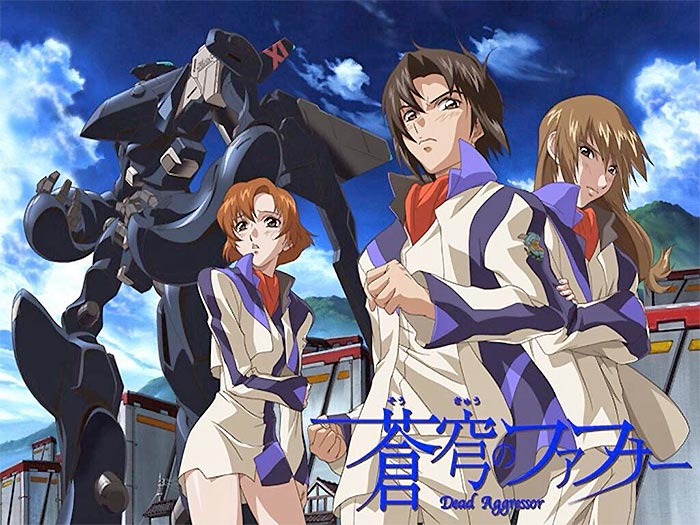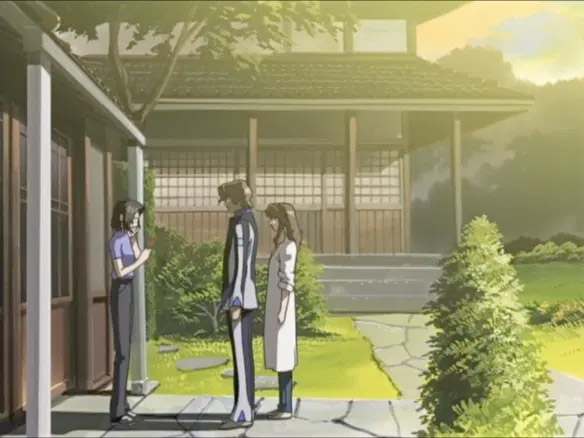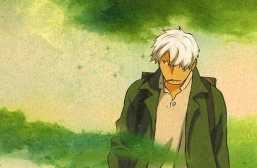Fafner in the Azure: Identity, Community, and Alienation

While imitation may indeed be the sincerest form of flattery, it can easily be overlooked as a mere acknowledgement of mediocrity. Directed by Nobuyoshi Habara, the Fafner in the Azure saga is a clear homage/clone of Neon Genesis Evangelion which pales in the shadow of its more famous predecessor. The object of this essay (which sadly will be littered with spoilers) will be to bring out the latent themes which make this series worth a watch.
Before getting into the thematic analysis, it would be prudent to understand the structure of the saga itself. The Fafner franchise consists of three anime series; Dead Aggressor (2004) and Exodus (2015) and the Beyond (2019-) as a movie Heaven and Earth (2008) as well as Right of Left an OVA. While it would be desirable for this discussion to informed by the latest entry in the series (the Beyond), it is left unaddressed since it is still ongoing.
The Fafner saga depicts the struggle of the residents of Tastumiya Island against the powerful alien race called Festum. The island’s defense is headed by a set of mechas called Fafner manned by graduating high-school students. Dead Aggressor starts off with a Festum attack compelling the protagonist Kazuki Makabe to use the powerful Fafner named Mark Elf. As attacks become more frequent he joined by his classmates including Maya Toomi. While the overall command is exercised by Kazuki’s (apparently) layabout father Makabe, their on-field operations were controlled by Soushi Minashiro. But since there’s no such thing as a free lunch, the price of using these powerful machines is assimilation into the Festum. This is a process by which the pilot’s consciousness is merged with the collective consciousness of the Festum.

While it is tempting to dissociate the essence of a story from the form in which it is encased, it would be unwise to do so since the means by which a story is conveyed across cannot be dissociated from the story in itself. The following section will deal with both the form of the narrative as well as the plot itself.
The Poetics of Belonging: Cinematography in Fafner
One of the character features of the Fafner saga is the breath-taking beauty which only a masterful soundtrack combined with mesmerising cinematography can provide. For example, the opening sequences of Dead Aggressor, Heaven and Earth as well as Exodus are breath-taking evocations of nostalgia.
This particular track seems invokes both a feeling of nostalgia for the environs of Tatsumiya island as well the inevitable mourning for the tragedy which continues to play out in the lives of its people. The wind by which we are introduced to the main cast seems to be filled with the monotony of life on the island. Another particularly beautiful sequence is the depiction of the Sunderbans in Exodus; of a forest teeming with life as our protagonists towards a refuge from both their human and alien enemies.

Plot
While Dead Aggressor seems to have the best artwork and music, it trips up in the story department. This is because there was a change in writers mid-season with Tow Ubakata taking over for which improved the quality quite a bit. While the first set of episodes are chock-full of fight scenes and new Nordic-sounding technology, there is a ubiquitous lack of cohesiveness which infects the narrative. For example, the ill-thought alternation between a love triangle between Maya, Soushi and Kazuki and the homoerotic undertones of Kazuki and Soushi’s relationship leaves a lot to be desired.

If one cannot build a castle on wooden foundations, it is no surprise that these birthing pains couldn’t be overcome by Ubakata in either Dead Aggressor or Exodus. That being said, however, Exodus which depicts the discarding of the island’s isolationism and the eponymous distress migration from Srinagar is a masterful work on its own merits.
Thinking About Community: Themes in Fafner
Having established the shortcomings of the narrative, it is best to analyze the underlying themes of identity, community, and estrangement. These themes are not only represented through the index of the Festum and the neo-UN, but through the very nature of Tastumiya Island itself which becomes a symbol for community 1.
Tatsumiya island was created as a refuge for the remnants of the Japanese race after the Festum attack robbed them of them their fertility. They’ve created a community which seems untouched by the struggle for survival that human beings are waging against the Festum so much so that our heroes are able to have the trademark anime high school experience. But this “false paradise” is dispelled by the invasion of the Festum.
Mortality and Identity
One of the enduring themes underlying Fafner dealt with rather ostensibly in the short life of Tsubaki Minashiro is that you have accept the certainty of death if you are to even clench the possibility of life. This dilemma is reified in the nature of the Festum; they are able to transcend space and time but because they go beyond both these planes.They are Nothingness. Thus existence necessitates that one be subject to the vagaries of time and the particularities of space.

But rather than just leave it at this, the anime makes a rather pointed comparison between the soulless Festum and the internationalist neo-United Nations with regards to their bloodlust for their opponent. However, it would be instructive to extend this argument to the nature of the Human Force as categorically similar to that of the Festum as existing outside of place. As opposed to the island of Tatsumiya which has a cultural identity of its own (notice the Japanese style of architecture and pattern of society), the neo-UN is housed in modern universalist trappings . This reflects its commitment to the abstraction of humanity as opposed to the Japanese concretisation of “being left alone”.
According to some accounts of human nature, human beings are shaped by two contrary impulses with regards to society; an enduring desire for autonomy (space) as well as a desire to belong somewhere (place) 2. The neo-UN is thought of as an organization which frees you from the shackles of convention that restrain the inhabitants of the island and enabling self-fulfillment through contributing to humanity’s struggle. However as the sociologist Robert Nisbet notes rational forms of organization lend themselves well to dehumanization 3 and therein tyranny. It is thus unsurprising that the soldiers of the neo-UN are tied to the their leaders not by devotion to home and hearth, but through abstractions about “the greater good”. It may be that these devotion to universal principles is the cause for the inhumanity of this cosmopolitanism and why killing Festum is more important than conserving humanity. The obsession with space created a monster which Tolkien had warned against.
“I do not love the bright sword for its sharpness, nor the arrow for its swiftness, nor the warrior for his glory. I love only that which they defend.”
JRR Tolkien The Lord of the Rings 4
If one does not believe in a home worth defending, then one risks being a prey to The Gospel of the Sword as the Neo-UN has with its ostensible humanism.
Community
Before talking of the significance of community in the series, it would be instructive to discuss Hegels’s notion of an ethical society (sittlich) which the island seems to embody. The ethos of the community is not formulated in explicit rules, but something one grows into as our protagonists grow into their roles as the islands’ protectors. For example Makabe is the commander not because he is appointed by law, but because he is the right 5 person for the job which militates against the ideals of the Enlightenment. This is because the Enlightenment tends towards value pluralism while traditional societies have a unified conception of values. Thus the residents of Tatsumiya island are united in their defense of their(Japanese) community as opposed to “humanity” as whole.
Tradition plays a seminal role in constructing such a society which is rooted in both custom and ritual. As opposed to the multi-cultural names of the Human Force such as General Narain Wiseman-Bose and Lieutenant Aishwariya Fein, most of the original inhabitants of the island are unambigiously Japanese. Their architecture and practises clearly reflect this “provinciality”.

The importance of ritual in social life on the island is reflected in both the Coming of Age Ceremony as well as the Bon Festival. The latter ceremony is especially relevant to this discussion because it is essentially the renewal of the only type of social contract which Edmund Burke would recognise “a partnership not only between those who are living, but between those who are living, those who are dead, and those who are to be born“ 6. The memorialisation of those who lost their lives in the Festum War alongside the celebration of an unborn peace lets the community become at home with itself.
While it may very well be that this is a community, can it ever claim to be a paradise if it refuses to recognise that it cannot fence the world out of yourself? Can a society which still persists in the illusion of a world before the Festum invasion be anything more than a “false paradise” as alleged by Hester Gallop and Yukie Kariya ? Is it not a farce of the highest order to continue acting as if there is still a Japan to go to when the children graduate high school?
While this deceit is considered to be problematic in most of its iterations (such as in The Divergent saga and The Giver quartet ), it is inverted through Maya’s development from the middle part of Dead Aggressor throughout Exodus. In many ways she embodies the devotion to the home once embodied by the goddesses of the hearth such as Hestia. While initially she plays a supportive role (she is the one who brings back Kazuki) tasked with maintaining morale by Kazuki in their assault on the Arctic, Maya grows into one of the triumvarate in Exodus.

As opposed to Kazuki’s saviour-complex, Maya fights not for salvation, but to protect her home and those who make the island her home. This commitment to protecting your home is easier to fulfill when you are slaying Festum, but not when you have to kill other humans to protect your community . But Maya has to do this in first shooting down the bomber which was bombing the island and then in defending Kazuki from assassins in the Neo-UN forces . This reiterates her role as the protector of the home 7. Yet unlike Kazuki, by the second killing she reconciles herself to the fact that to be truly devoted to your home is to accept that you will have to get your hands dirty.
The implications of this change point toward the reality that it was the community’s performance of peace that made the island a paradise. The peace that Kazuki was born into would not have been possible if the community had acknowledged the Festum and rather would have been the lives of the neo-UN citizens who have never seen even a modicum of peace. They were able to experience peace because they acted as if life was peaceful; the performance becoming life itself. As reflected in Maya’s transformation, we do not protect home because it provides us solace, but because we love it. This reflects GK Chesterton’s understanding of greatness.
People first paid honour to a spot and afterwards gained glory for it. Men did not love Rome because she was great. She was great because they had loved her.
Orthodoxy 8
Alienation
Rather than look at the Marxist understanding of alienation it would instructive to look at alienation as “not being at home with the world” . The problem of integrating oneself with a community which has an ethos of its own is evident in the dilemma faced by the neo-UN forces when they encounter the “nationalist” islanders.There are apparently two paths by which this problem can be resolved according to Peter Lawler 9 by either “making the world your home” or “making yourself at home with the world” ; the path of either Marx or MacIntyre.
The homo faber 10 strives to recreate the world in tune with some objective end in mind starting from a tabula rasa to become comfortable with his world (both natural and social). As children of the Enlightenment the neo-UN tried to coerce the islanders into the path of humanity, but in the process occupied them. The doctrine of reason and freedom has bestowed us with many a bounty of human rights, but it has also brought us the guillotine, gulag and gas chamber.
….” that the effort to make us fully at home in the world has the paradoxical effect of making us feel more homeless than ever.”
Obituary to Peter Lawler in The Week by Linker 11
The other alternative is to accept the ethos of the community before trying to becoming change it as McIntyre implies. This involves subordinating yourself to the practices 12 of the community as the defectors of the neo-UN who have given up their identities as soldiers in favour of a place offered by the islanders. A case in point would be the transformation of no-nonsense soldier Kanon Memphis into Kanon Hazama, the daughter of Ms. Hazama; from professional into a relational being. By the time she faces her end Kanon has overcome the estrangement which characterized her till then. The way forward according to Fafner would be to first subordinate yourself (assimilate) to the pursuit of the ends of an association before making claims (demands) of that association or as Chesterton put it that” a thing must be loved before it is lovable.”

This series tries to address the problem of alienation in world where the general and universal seems keen on swallowing the particular and parochial. Rather than advocate for the continuation of the Enlightenment project, Fafner in The Exodus points towards the communitarian alternative that is fast becoming a distant memory. Perhaps that is the cure that the doctor ordered for our restless world
There’s always more to see and more to know, but there’s also the kind of confidence that’s not complacency which comes when we see more clearly who we are and what we’re supposed to do, when each of us finds the cure for being abstracted by discovering our place in the world with others.
Higher Education as American Counterculture – Peter Lawler
Works Cited
- See James Monaco’s How to Read a Film p.84 for a discussion of Peter Wollen’s film semiotics. ↩
- The place-space dichotomy is something that has been discussed extensively by Peter Jonkers whose guest lectures I was honoured to be able to attend. His How to Respond to Conflicts over Value Pluralism? is a fine introduction to value pluralism and its discontents. ↩
- Robert E Nisbet made reinforcing the intermediary institutions his life’s mission. See his Still Questing for Community and Has the Modern Family Failed Us ? for conservative defense of the “little platoons” republished in The Imaginative Conservative. ↩
- Tolkien, JRR; The Two Towers ↩
- This idea of non-alienation as being at home at with the world is discussed by philosopher Frederick Dolan here. Things are right not because society considers it right, but because it is right. ↩
- Reflections on the Revolution in France p.40 ↩
- This motif is not uncommon in anime as seen in Seyla Moss’s defense of her home in Mobile Suit Gundam: The Origin(2015-2016) or in Lenalee Lee’s power-up at the end of D Gray Man (2006-2008). In fact Commander Lana Inez makes a pretty pointed reference to the woman as protector of home trope in Argento Soma (2000). ↩
- Chesterton, GK; Orthodoxy Ch5 ↩
- The postmodern conservative philosopher deals with this problem extensively in his essays. See his What is Human Dignity? and Higher Education as American Counterculture for an introduction to his realist conception of human dignity. ↩
- Discussed extensively by Hannah Arendt ↩
- https://theweek.com/articles/701064/why-every-smart-liberal-should-read-conservative-philosopher-peter-lawler ↩
- The IEP does a fine job of summarising MacIntyre’s notion of practises here ↩
What do you think? Leave a comment.











The Fafner series is basically Gundam Seed/Destiny on crack.
I really need to check that out.
It is underrated as a series. I’ve watch this anime 1 year ago and I want to rewatch it.
Yeah, do check out The Beyond as well when you’re at it.
Great series. What interested me the most is, how fair development of characters is given to all cast, not only focusing on the main characters. You will also noticed the variation of attitudes and issues between the casts is brought up in the series.
Especially the second generation of pilots
I enjoy the series. It’s one of the series where I can’t put down until I finished it. And I would love to have a rewatch of this anime *if only my sis will return it to me rite nw*.
I’m sorry about your loss, Bren.
Felt the ending left me a little unsatisfied/sad. But it’s the matter of opinion.
Yes, though I think it was meant to be that way. The movie is a direct sequel
This suffers from the “frequently not making sense” syndrome, and from time to time characters say absolutely nonsensical things, or explain concepts in such a manner; I can only assume this is an attempt to be deep and mysterious gone slightly awry.
Yes, especially all of that dialogue about understanding the Festum. It was really badly done, but the themes discussed are worth examining.
Watched this recently. As a whole, both the characters’ conflicts and the plot made me want to keep watching, made me wonder how it would end up in the end. Was I satisfied? Yes, and no. There’s no top marks, but it certainly wasn’t bad.
I love post apocalyptic settings.
Great writeup. The anime touches upon many subjects that its genre brethren touches upon. Death, and existence. Individuality, and life. The Festum have a habit of asking the seemingly insignificant question “are you there?” – a question with a more metaphysical implication than one would think at first. Can you truly be said to live, to be here, if you have no reason for living? If life holds no intrinsical value for you?
The anime tend to be, at times, quite iffy. 🙂
Yes, I have to agree with that characterization. There is a lot of things that could have be done better; for example Shoko’s death early on was a waste since the viewers had not bonded to her. Plenty of errors in storytelling , but I think the second series is a lot better in that regard.
You know what I will watch during the weekend? This one!
Good to know that, Brian…
Fafner is a fairly entertaining mecha anime. I plan on revisiting it.
I have been hearing about this anime for quite some time now and expected something decent at the very least. I had almost dropped it after 9 episodes due to execution and characters but I found myself thinking about the plot after a while and came back to it. With that being said, I do agree with most of your article. Thanks.
Yes, it gets a bit better after episode 13. The second series “Exodus” is definitely miles better.
I could not get over how the writers of the show had a message to convey and how characters did everything to validate it. It was not people’s natural behaviour that pushed the story forward here, it was the message.
There were many instances where someone acted like a completely different person because that suited the story. There were many cases of sudden, unexplainable change in behaviour that, again, were there only to point the viewer at a particular idea. I felt I was watching characters being jerked sideways by invisible strings to make them behave as it was required of them.
Yes the plot and narrative have serious issues. For example Shoko’s death in the beginning just was meaningful in anyway. The whole Soushi-Kazuki dynamic is more than a bit awkward.
The commander dying so quickly. :'(
I problem I have with this is the way it portrays the “evil” characters. They are introduced in much the same way as the Big Bad Wolf from Red Riding Hood: rotten to the core and ugly to boot.
A pair, foster parents, badmouths their adopted son pretty much from the get go. You have to be pretty screwed to do that to someone you’ve seen growing and whom you cared for for about 16 years of your life, and it’s not just one parent, it’s both of them! It’s even more difficult to swallow since their son seems to have grown up all-right. And when we see how bad are they? It turns out they are spies and it gives even more ground to expel them from the island. Talk about fortuitous development.
Yes, that was quite nasty. There’s also Maya’s dad who seems to be the average douchebag. The second series Exodus has a much better cast, with the second and third generation pilots alot more interesting. Kanon also sees quite a bit of character development there.
Soukyuu no Fafner is so much more than just one of thoose Mecha-series. Thank you for highlighting it.
I loved the one-hour-last-episode. I remembered I was squeesing my pillow extra hard during that time.
It made me laugh, made me cry, and sometimes it was to exiting I couldn’t breath.
The story was a little complicated for me, but still it was good.
Most of this anime reminded me of Evangelion, down to the music and most of the mood of this show, except the one thing that separates it from Evangelion is the fact that it manages to stay optimistic throughout most of the series.
Fafner is in someways a different kind of a Mecha series, but it does fall within the range of what I call an Emotional Mecha series, it has melodrama, ethical questions and an enemy that does not understand humanity.
That one is the most in demanding and your writing is appreciated.
Thank you, I really appreciate this
I enjoy the story-line and learning about the characters through-each episodes but in some ways, this series is bitter-sweet, it’s not a happy and not a sad series, you feel somewhat unsatisfied.
Really liked this anime. It takes a couple episodes to get off the ground but I think Episode 6 is when the series really changes things up.
The characters are very enjoyable and interresting, but they put also some “cliché” in their personality. Do you need to care about this cliché, NO!
I thought it was weak. I guess my biggest problem is the fact that the action was relentless for around 9 episodes and they tried to create drama in that time frame. If this series were 50 episodes then I can under stand the pacing but it was only 25 episodes.
Yes the pacing was very ill thought-out. They should have stuck with Tow Ubukuta from the beginning.
I remember this, particularly the OST. The series’ soundtrack is very often absent, or quiet – which can be efficacious at times, but at other times I feel it works against it purpose.
Yes, that can be a problem.They redid it a bit for Exodus, which was a definite improvement.
Just picked this up on ebay for $32 shipped. I found I was drawn to geneon titles, and when the company fell apart and discontinued its anime productions, I vowed to hunt them down. Gems of my collection include both kyo kara seasons in leather collector books, and a special R.O.D. Collectors edition that has all the japanese voice stars signatures on the cover. Next on my list is Rozen maiden… And girls bravo (pervy I know).
That main character literally look like Shinn Asuka. That makes Shinn Asuka has a lot of character development, much better than Kira Yamato.
Soukyuu no fafner and psycho pass are my favorite anime.
An anime of the good old Evangelion school!
This has one of the best soundtrack I ever heard. The choice of instruments are excellent. It fits perfectly with the action and the calm moments.
It’s basically a good story played out by unconvincing characters. 😀
Yeah, all the pilots are pretty insufficient characters. The second gen is way better.
Hello Sathyajithè!
There are mecha series of its kind that are better – but it was enjoyable.
The anime is rife with symbolism!
The series finale was good!
Weak start but good ending.
Sadly underrated series. The story is sublime and the actual animation is jaw-dropping to say the least. I have to say this article has definitely brought me an immense amount of nostalgia that’s only achievable by referencing a certain number of series. This one is close to the top of my list.
Good to know that I was able to do that.
I find this fascinating.
I see shades of the Tokugawa Shogunate in Farmer, in that both have a romanticized portrayal of society for the modern’s eye with a withdrawal from the world and isolation seen as the ideal.
Thank you for that insight. In fact, I feel many mecha anime have undertones of that like Valvrave
Interesting information about Fafner Saga that I wasn’t aware of. great!